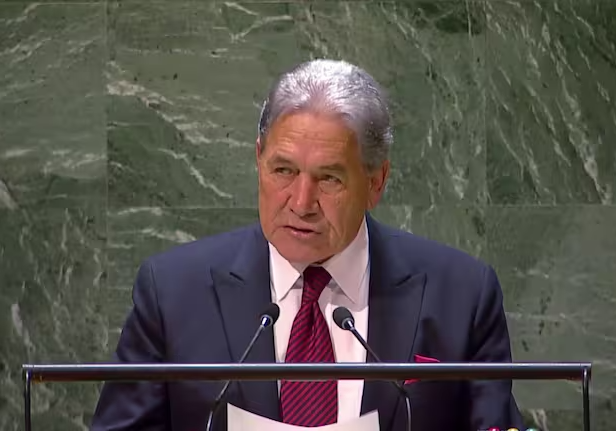Australia/Israel Review
Myths and Facts about 18C
Nov 21, 2013 | Daniel Meyerowitz-Katz

Daniel Meyerowitz-Katz
There has been much comment over the past month on section 18C of the Racial Discrimination Act – the Federal law against racial vilification. The provision makes conduct unlawful when it is done “because of the race, colour or national or ethnic origin” of a person or group of persons, and it is reasonably likely to “offend, insult, humiliate or intimidate” that person or group. Attorney-General George Brandis recently announced that one of his first acts as Attorney-General would be to alter the provision by at least removing the words “offend” and “insult”, as well as potentially making other unspecified changes.
During the public debate, 18C was repeatedly mischaracterised and, it seems, is often poorly understood by some commentators. Here is our attempt to clarify some myths about this legal provision.
“Offence” and “Hurt Feelings”
“As the IPA has made unambiguous, legislation based on hurt feelings is never a good idea.”
Sabine Wolff, IPA ‘Freedom Watch’ blog, 10 Sept. 2012
“Vilification is not the equivalent of causing offence nor is it the equivalent of hurling insults.”
The Australian, Editorial, 9 Nov. 2013
The reading of 18C as a “hurt feelings test” mischaracterises the provision. Causing offence itself is not what makes the conduct unlawful; in order to breach 18C, the offensive act must have been done to someone because they happen to have been born a certain way.
In addition, racial vilification is more than just incitement to racial hatred. The Oxford English Dictionary defines “vilify” as “to lower or lessen in worth or value”. There are two prongs to lowering the value of the members of an ethnic group: reducing their value in the eyes of others; and causing them to feel as though they are worthless and unwanted.
Causing offence and hurling insults are the means by which a person is made to feel unwanted. Legal philosopher Jeremy Waldron, a leading expert on hate speech, draws attention to the effect on people of being routinely harassed in public because of their race. This clearly communicates to them and to others that they are not full citizens and do not deserve the rights to which others are entitled.
Imagine being a member of a racial minority and having to explain to your children why your family is subjected to constant insults, and why it happens to you and not others. Such situations are nothing if not humiliating.
The courts have tended to recognise that this is the case, so have treated “offend, insult, humiliate or intimidate” as one test rather than four. In fact, the word “offend” has been read narrowly, in light of “the words chosen as its partners”, to refer only to “profound and serious effects, not … mere slights.” (Relevant cases include: Creek v Cairns Post Pty Ltd (2001) 112 FCR 352, [16]; Jones v Scully (2002) 71 ALD 567, 592; Eatock v Bolt (2011) 197 FCR 261, [265].)
Furthermore, the use of the concept “offend” is hardly unique to this law. The words “offend, insult, humiliate or intimidate” themselves were lifted from section 28A of the Sex Discrimination Act. In a similar vein, it is an offence to engage in conduct in front of someone, without their permission, which is “offensive to the sexual modesty” of the average person.
There are also breach of the peace laws, which for centuries have banned publicly engaging in conduct “calculated to wound the feelings”, and it has been a Federal offence for over a century to send “offensive” material through the postal service. It is an offence in South Australia to exhibit “offensive material in a public place” and in NSW to conduct yourself “in an offensive manner” or to “use offensive language in or near … a public place”.
Many of these laws have been in place since colonial days. Legally prohibiting “offence” under certain circumstances has been a part of Australian democracy since its inception.
18C and existing offences
“The most egregious sort of acts which could be considered to be humiliation and intimidation under section 18C are also covered by other state and federal statutes. There are many laws against intimidation, disorder, stalking, and offensive conduct – to say nothing of state racial and religious vilification laws.”
Chris Berg, The Drum (ABC), 12 Nov. 2013
The laws to which Berg was referring are serious criminal offences involving heavy fines or jail time. This means they require a criminal standard of proof “beyond a reasonable doubt” and can only be enforced by the DPP.
18C operates quite differently. It does not create an offence per se; rather, it makes certain conduct unlawful. This means that there is no fine or jail sentence for people who breach it – the court can only order injunctive relief or compensation. In most cases, people are simply told to cease and desist from the offending behaviour, or to make public retractions.
18C does not rely on government prosecutors but provides legal redress for people affected by the proscribed conduct. It also requires conciliation by the Australian Human Rights Commission for every complaint, which may only go to trial if the AHRC does not throw the complainant out for lack of merit and if the parties cannot reach agreement during conciliation. Last year, the Commission received 192 complaints under 18C of which just six ended up in court.
18C provides a unique recourse for victims of racial vilification to confront the perpetrators. It does not duplicate existing offences.
The Criminal Code and “incitement to racial hatred”
“The Commonwealth Criminal Code outlaws incitement to racial hatred and the government has no plans to remove those provisions.”
The Australian, Editorial, 9 Nov. 2013
Incitement to racial hatred is illegal under the laws of some states/territories, not under the Commonwealth Criminal Code. While sections 80.2A and 80.2B of the Code do create offences punishable by up to five years imprisonment for “urging violence” against a group “distinguished by race, religion, nationality, national or ethnic origin or political opinion”, this outlaws incitement to violence, not racial hatred.
It is also a very narrow offence. Such “incitement”-style offences only apply where there is an identifiable actual or potential violent incident and it is proven beyond a reasonable doubt that the inciter intended for that incident to occur. Moreover, all states and territories have laws against inciting violent crimes in general with harsher penalties than five years in prison. The usefulness of sections 80.2A-B is therefore unclear.
Defamation
“Errors of fact are properly addressed with corrections or defamation proceedings.”
The Australian, Editorial, 9 Nov. 2013
Defamation applies only to individuals, so members of a race or ethnic group that has been vilified would not have recourse to the courts under defamation law. It is precisely this gap in the law that racial vilification laws are intended to fill.
Free Speech
“18C … has been a direct threat to Australians’ free speech since its inception.”
Vivienne Crompton, IPA Freedom Watch blog, 30 Sept. 2013
18C was introduced in 1995. Up until the case of Eatock v Bolt in 2011, there was not one decision under the law which attracted significant criticism on free speech grounds. One constantly overlooked aspect of 18C is its partner provision, section 18D – which contains a number of exemptions to 18C, including: artistic works, conduct for any purpose in the public interest, or a fair comment on any matter in the public interest.
The reason that columnist Andrew Bolt was not exempted under this provision was that Justice Bromberg found that his conduct had not been in “good faith” but there have been numerous cases in which conduct was found to breach 18C and was not unlawful because of 18D.
The most high profile of these concerned a cartoon published in the West Australian newspaper regarding the return of the head of decapitated Western Australian Aboriginal leader Yagan, which depicted Aboriginal elders treating the return of the head as an opportunity for a free junket to England. It was found to have breached 18C but to be exempt under 18D.
Previous Cases under 18C
“18C has been used against people who aren’t conservative columnists. But those other uses do it no credit. … one section 18C case … targeted a news website for anonymous comments. In September, another case in the Federal Court fined a lawyer $12,500 for calling a security guard a “Singaporean prick” four years ago… Now there’s a looming case against the anti-Israel Boycotts, Divestments and Sanctions [BDS] campaign.”
Chris Berg, The Drum (ABC), 12 Nov. 2013
Berg does not believe in racial vilification laws on principle, but it does him little credit to misrepresent the history of cases under 18C.
It is completely disingenuous to argue that 18C has not been used to counter serious vilification of Australians.
For example, a number of the most important decisions were litigated by AIJAC’s Jeremy Jones on behalf of the Executive Council of Australian Jewry. One case shut down a website which denied that the Nazis had ever committed genocide against the Jews and claimed that the Soviet Union was the result of a Jewish takeover of Russia. Another prevented a woman from distributing material claiming, amongst other things, that the Jewish religion promoted paedophilia, while another prevented a small political party from circulating material alleging that Jews created the internet to corrupt the youth of the world via pornography.
The BDS case Berg mentioned is not being brought under 18C at all, but under section 9 of the Racial Discrimination Act.
The Singaporean security guard that Berg mentioned worked in a court. The incident in question occurred when a lawyer refused to be searched by him and instead began screaming abuse: calling him a “Singaporean prick” and telling him that he was not welcome in Australia. This took place in front of his co-workers and members of the public. The humiliation caused the guard severe psychological harm. The lawyer was found to have committed professional misconduct, lost her licence to practise law, and was found to have breached 18C. The compensation was particularly high because she had attacked someone who was protecting public safety, brought the legal profession into disrepute, and to cover the security guard’s psychological treatment.
The other case concerned an online newspaper report on an incident in which a group of Aboriginal boys who had stolen a car were killed by police. Comments by anonymous individuals published below the article blamed Aboriginal Australians in general for their supposed “criminal behaviour” and said that the Aboriginal community had “no one to blame but [themselves] for the deaths”.
Such comments are humiliating for any Aboriginal person and strike at the dignity of the entire Aboriginal community, especially in the context of the deaths of the boys, but no specific individual could claim to have been defamed.
The court found that the newspaper was responsible for publishing those comments on its website and required the newspaper to moderate its comments to prevent similar racist abuse.
Far from “doing it no credit”, both cases are good examples of why 18C is necessary.
Tags: Australasia






